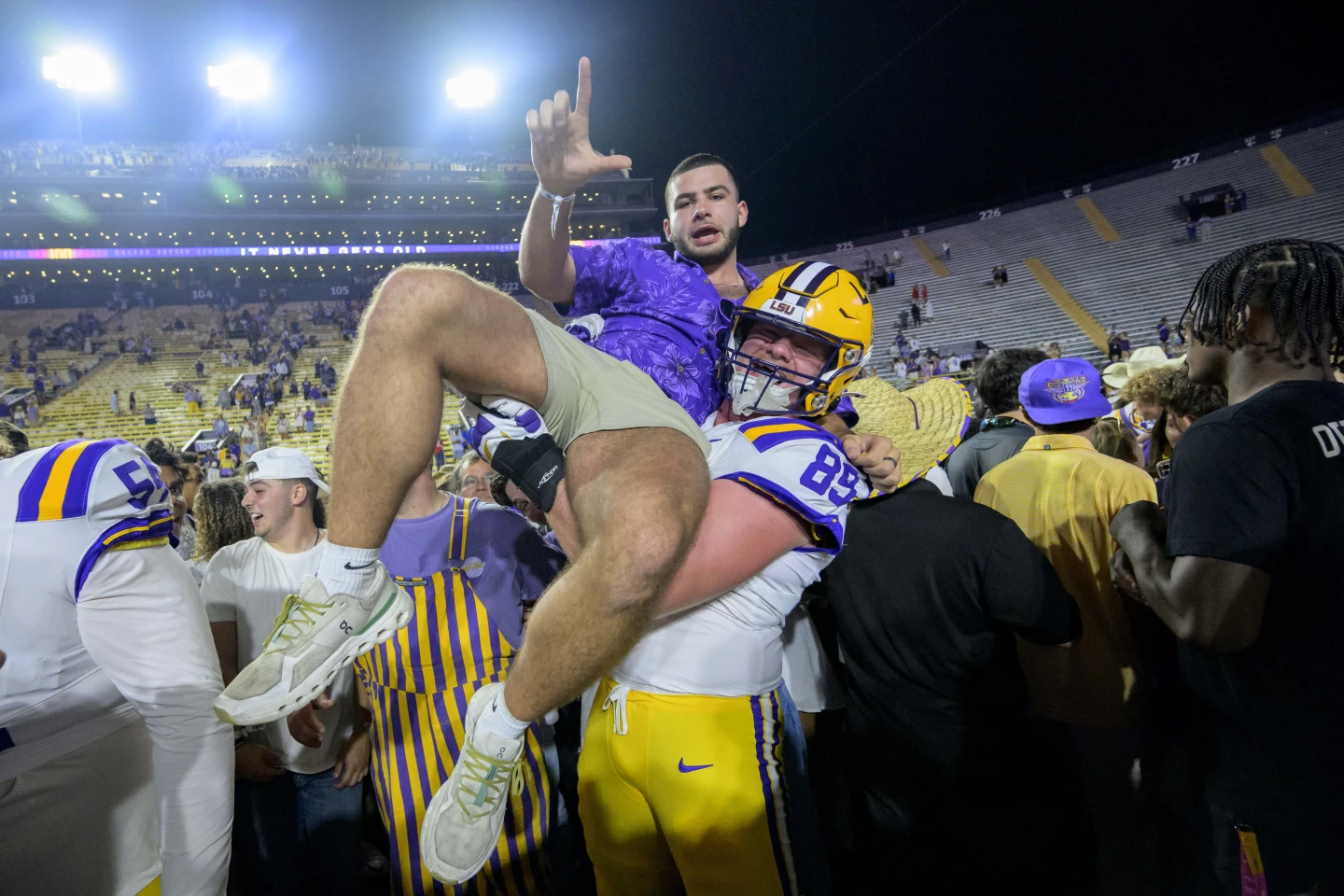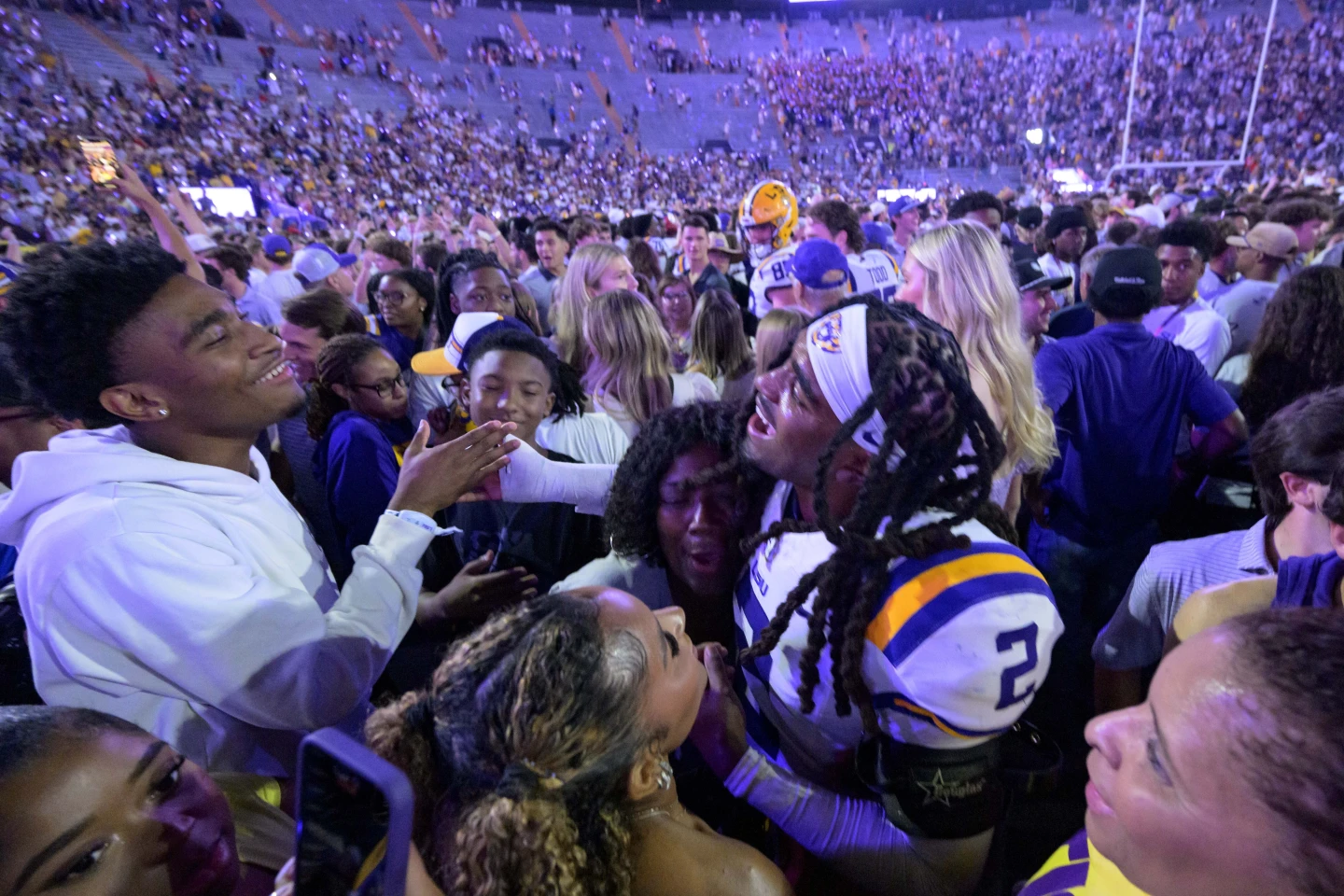If 16th-ranked LSU beats No. 14 Alabama on an upcoming Saturday night in November and fans rush the field again, the Tigers’ athletic program could face a fine of up to $500,000 to pay Alabama.
This important rivalry game on November 9 could test a Southeastern Conference policy on field invasions that was changed before the last football season.
The aim of the policy was to prevent such incidents, but a few have still occurred this season — including at LSU when the Tigers defeated Mississippi in overtime on October 12. LSU had to pay $250,000 to the Rebels. If another field invasion happens, LSU could end up paying a total of up to $750,000 to SEC rival programs just this football season.
While LSU coach Brian Kelly is concerned about safety when fans rush the field, he isn’t overly worried about the fines — even during this time when schools are spending more on players through NIL deals and would prefer not to contribute to their rivals’ athletic budgets.
“Those kinds of penalties are probably going to be passed off through administration, and I just don’t see that impacting NIL to the point where there’s a competitive advantage,” Kelly said.

Kelly added, “I don’t want to sound like I’m advocating, but if you’re winning each week and storming the field, your NIL is going to go up because you’re generating a lot of support yourself. I’m not trying to be a wisecracker here in that sense, because it is a serious matter.”
Since joining LSU in 2022, Kelly has seen three field invasions at home and two on the road, and he does not question the current fine system.
“They should be fines that you feel,” Kelly said. “And what you try to do is your due diligence to make sure that there’s beefed-up security so you can keep people from washing onto the field to the point where there are security risks.”
The fines apply to both football and basketball combined.
A first offense costs $100,000, a second offense is $250,000, and the fine goes up to $500,000 for a third or any following offense.
LSU had to pay $100,000 when fans rushed the court after a men’s basketball win against Kentucky last February. This is why the payment to Ole Miss this football season was $250,000. Additionally, LSU received $100,000 from Mississippi after losing to the Rebels in Oxford in 2023.
Meanwhile, fans have rushed the field after Alabama’s losses at Vanderbilt and Tennessee this season, and the Crimson Tide will receive $100,000 from each program. Tennessee is currently in a better position because it got $250,000 from Arkansas after losing on the road to the Razorbacks on October 5.
While field invasions haven’t completely stopped, SEC officials are pleased with the efforts made by member schools to safely and quickly get visiting teams off the field as fans rush over the walls. SEC Associate Commissioner Herb Vincent said that this was a main goal of the new policy.
“There has been an increased focus by our schools to keep players and team personnel safe when it does occur,” Vincent said. “School game management staffs have especially put a lot of time into developing effective strategies for safely getting opposing teams and staffs off the field.”
Vincent attended the Ole Miss game at LSU and saw how security workers quickly set up ropes in front of the Rebels’ bench as the winning touchdown was scored in overtime, creating a temporary barrier that helped Mississippi reach its locker room with minimal interference from fans.
Alabama’s first-year coach Kalen DeBoer was happy that there were no major incidents involving his players at Vanderbilt or Tennessee.
“All it takes is one fan who is a little over the top and gets connected with maybe one of our players who’s super emotional, just laid it all on the field and you’ve got a recipe for something that could go wrong,” DeBoer said. “Our guys have handled themselves well when we’ve been in those situations.”
While Ole Miss coach Lane Kiffin pointed out that the number of field rushing incidents this season suggests that current policies might not be effective, Vanderbilt coach Clark Lea had a more balanced view.

“The fines are a deterrent, and I support all that,” Clark said, adding that he does not believe there’s “any room for fan engagement on the field because you put at jeopardy the safety of the opposing team.”
“There aren’t a lot of boundaries in those moments and it’s very hard to get order,” he added.
However, when he thinks about the aftermath of Vanderbilt’s upset of then-No. 1 Alabama — when fans rushed the field, took down the goalposts, paraded them through Nashville, and threw them in the Cumberland River — he feels good about it.
“That moment’s very special and something I’ll always carry with me, and I really don’t want it to play out any other way, to be honest,” Clark said. “We needed that as a community here. This community deserved that celebration. And yet I want to grow beyond it and want to get to the point where we expect to be in those games and to win them.”
